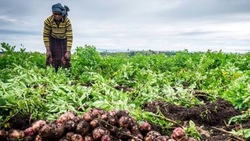Macau Hub | 3 February 2020
Angola has the potential for large-scale agriculture
Angola has a high potential for agriculture on a large scale and can diversify its economy through this sector in order to overcome some constraints, according to the International Financial Corporation (IFC), of the World Bank.
In an article published in January on the changes underway in the Angolan economy, the IFC asserts that, together with the World Bank, it is currently working in collaboration with the Angolan government and the private agro-industrial sector in Angola to strengthen the chain of agricultural supplies, promote investment in the sector and link small businesses to agricultural markets.
According to the IFC’s representative in Angola, Hector Gomez Ang, “Angola has great potential to produce high-value agriculture and on a large scale.”
“The recent reforms have triggered the entrepreneurial spirit of Angola, creating an exciting and fast-paced environment,” he said.
To stimulate investment in agriculture and the country in general, the IFC recommends comprehensive reforms and improved regulations, particularly in the sectors of transport, energy and information and communication technologies.
The diagnosis of the Private Sector in the country, prepared by the World Bank in 2019, showed that Angolan companies need greater access to foreign exchange, which “should improve soon with the recent liberalisation of the exchange rate.”
“In agriculture, specifically, most rural land is not formally registered or included on a database. The agribusiness value chains are weak and poorly coordinated,” according to the same study.
Roads are another problem, as only one-fifth of the national network is paved and less than one-third of the population has access to electricity, leaving the majority of companies dependent on diesel generators.
Financial services are also limited, added the IFC, and approximately 92% of small businesses in Angola do not have access to financing, while less than a third of the population has bank accounts.
Despite the abundance of fresh water and arable land in Angola making the country particularly attractive for investments in agriculture, and the growing market – the population of the country is one of the fastest-growing in Africa and according to data from BMI Research, spending on food and non-alcoholic drinks will grow by 23% between 2017 and 2021 – “the country could be producing much more,” said the IFC.
Private equity fund Angola Capital Partners wrote that only 10% of the 35 million hectares of arable land in the country are currently being cultivated.
The IFC identifies an increase in investment in the agricultural sector in Angola, pointing out the cases of retail chain Alimenta Angola, which is expanding horticultural production to supply its stores, and agricultural company Nova Agrolider, which is investing in its farms, registering an increase of its exports of bananas and other fruit to European and regional markets.
Angonabeiro, of Portuguese group Delta, is investing in coffee production and processing in the country, and the drinks company Castel Group recently announced an investment in the production of maize.
The IFC recalls that Angola was once an important producer and exporter of agricultural products, such as coffee and sugar cane, but exports virtually ceased in the 1990s due to low global prices and a lack of investment. (macauhub)












